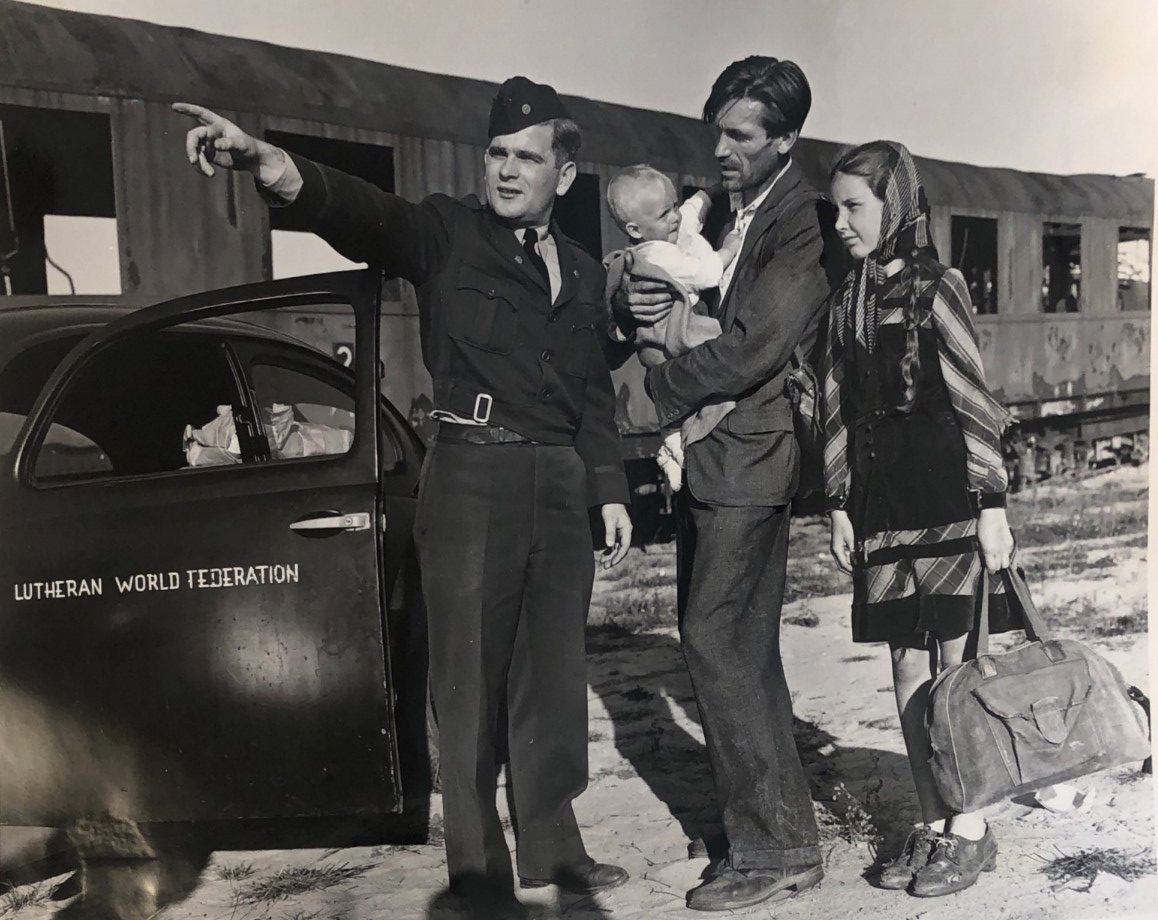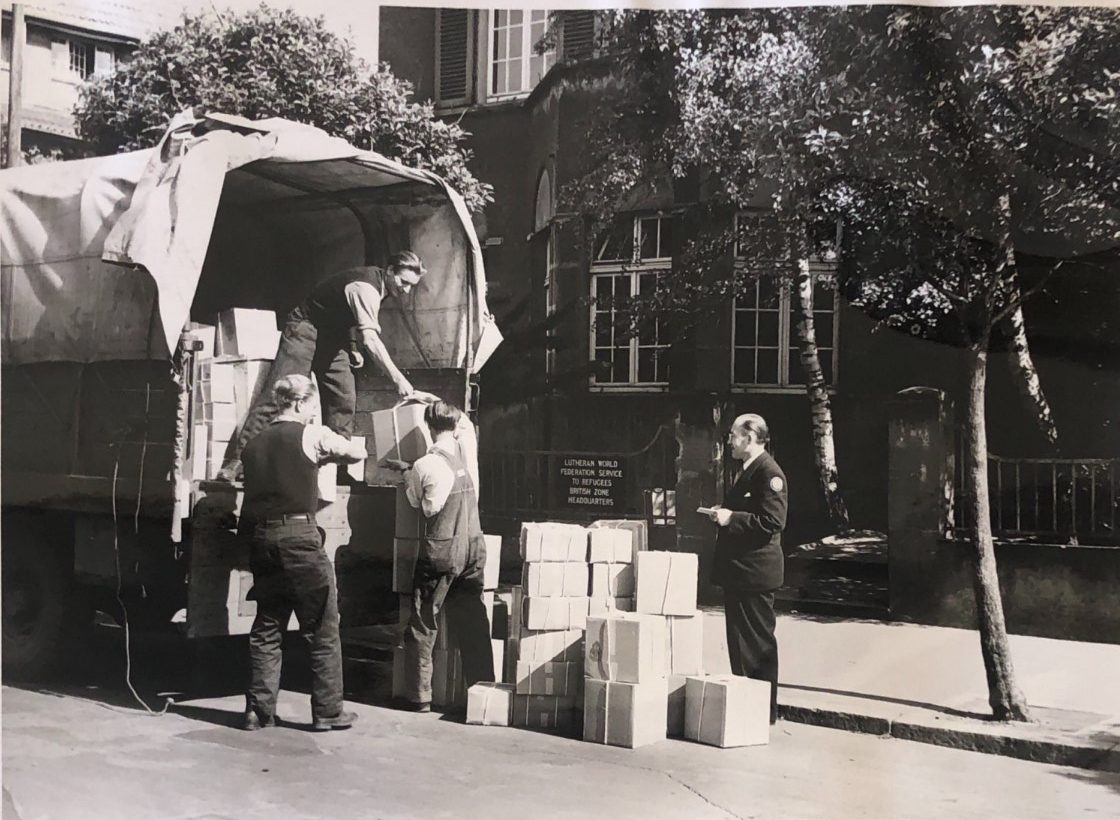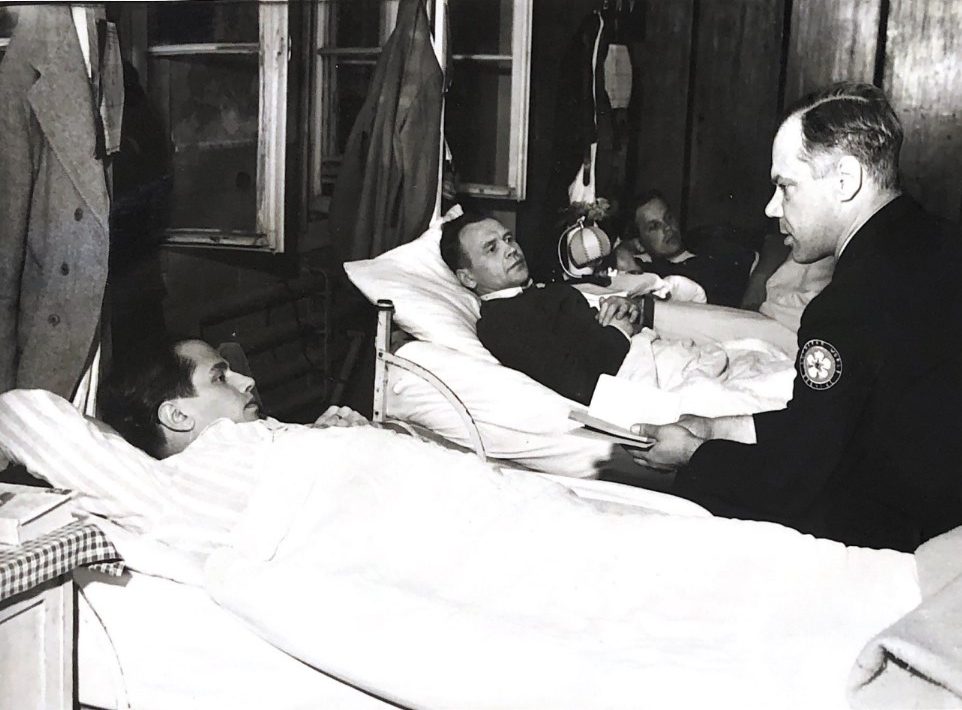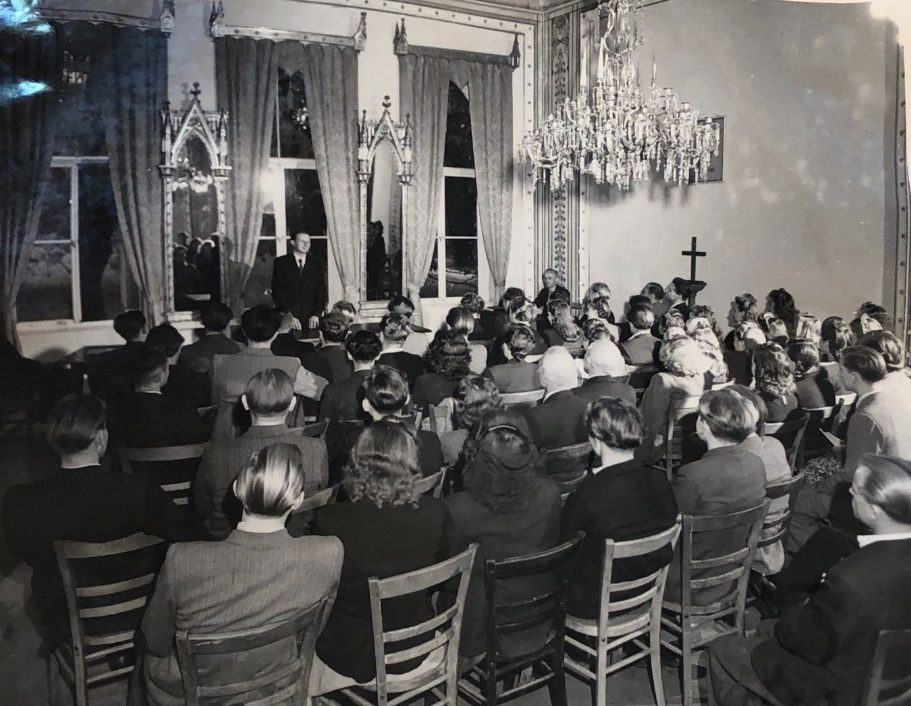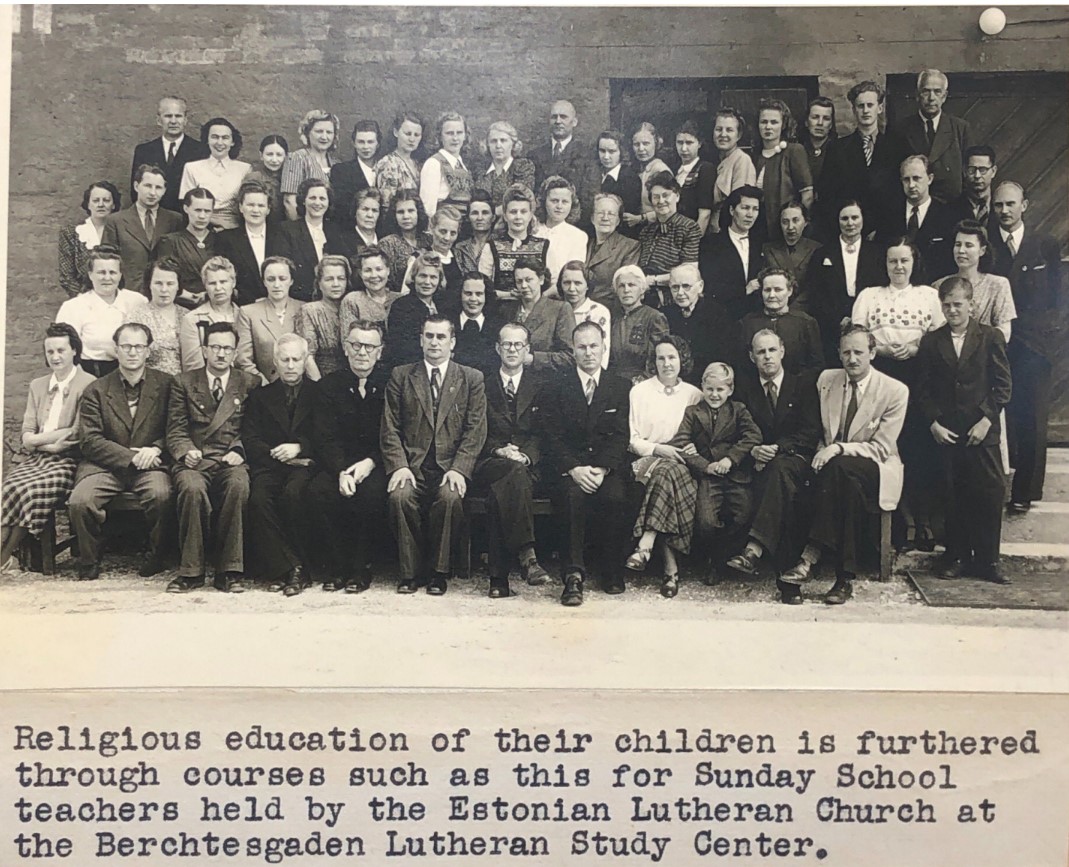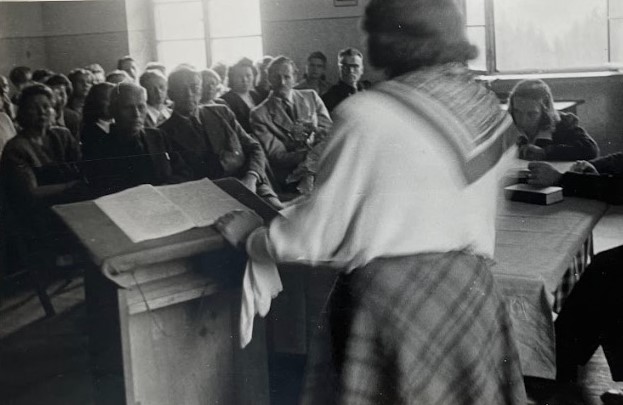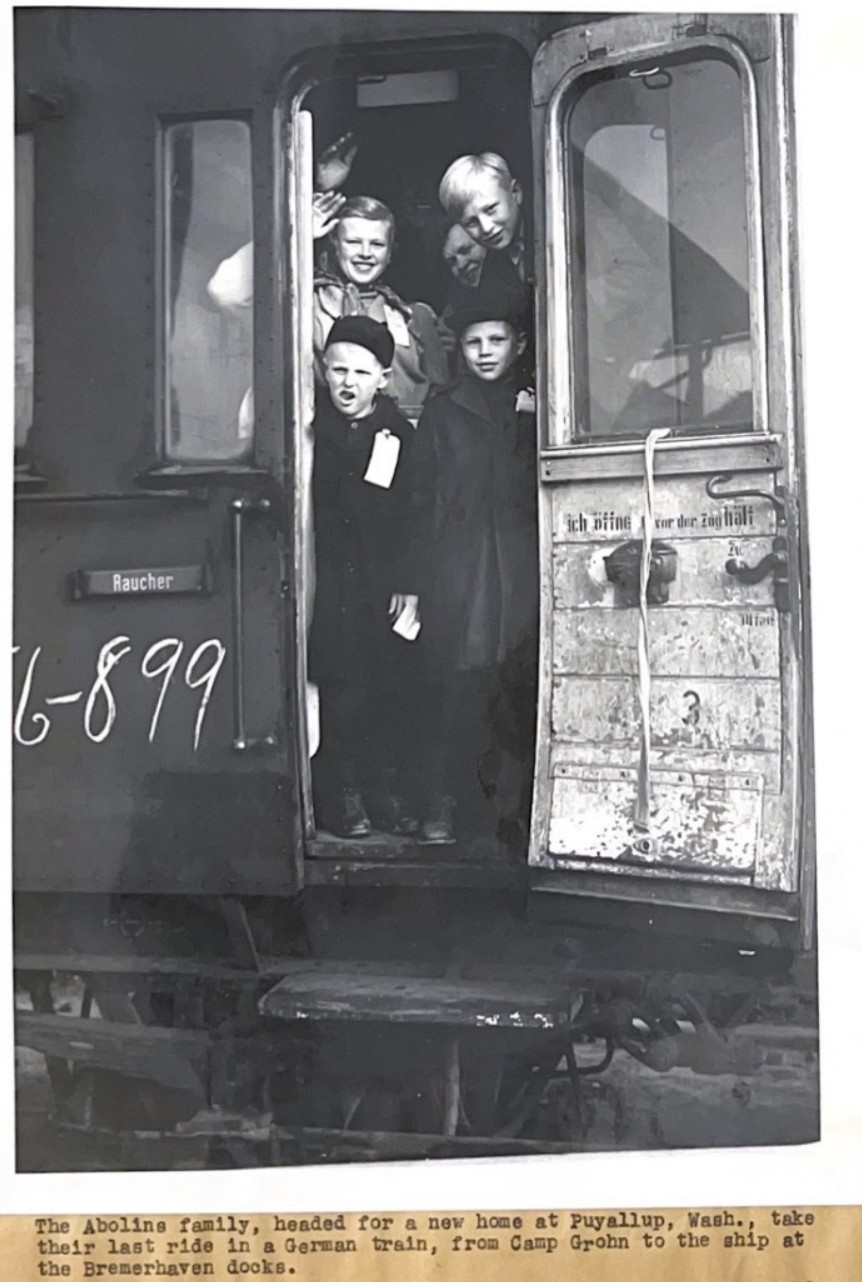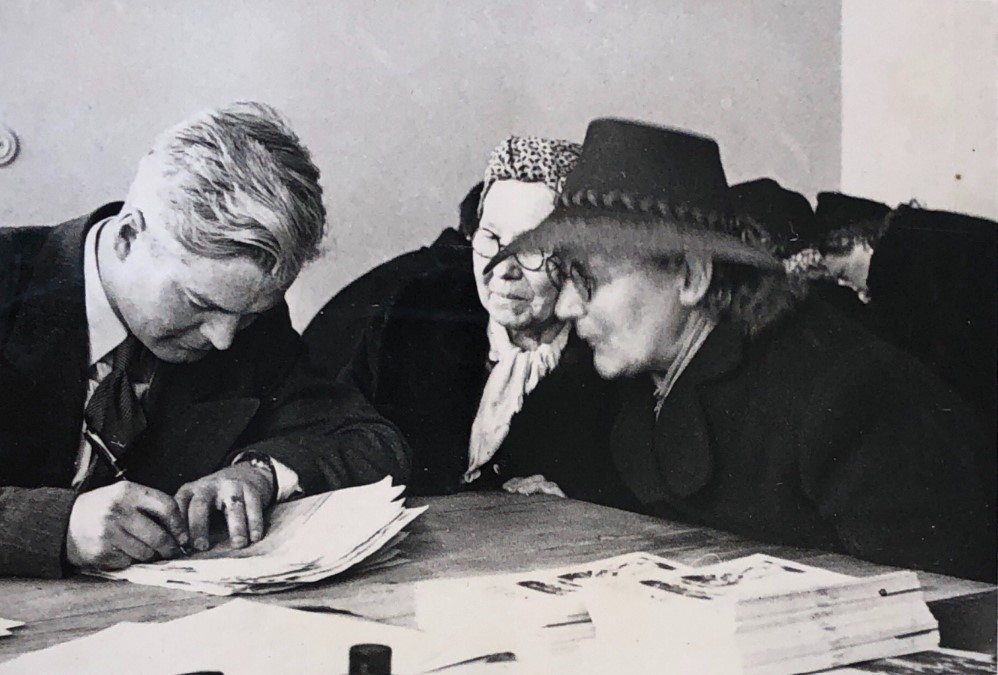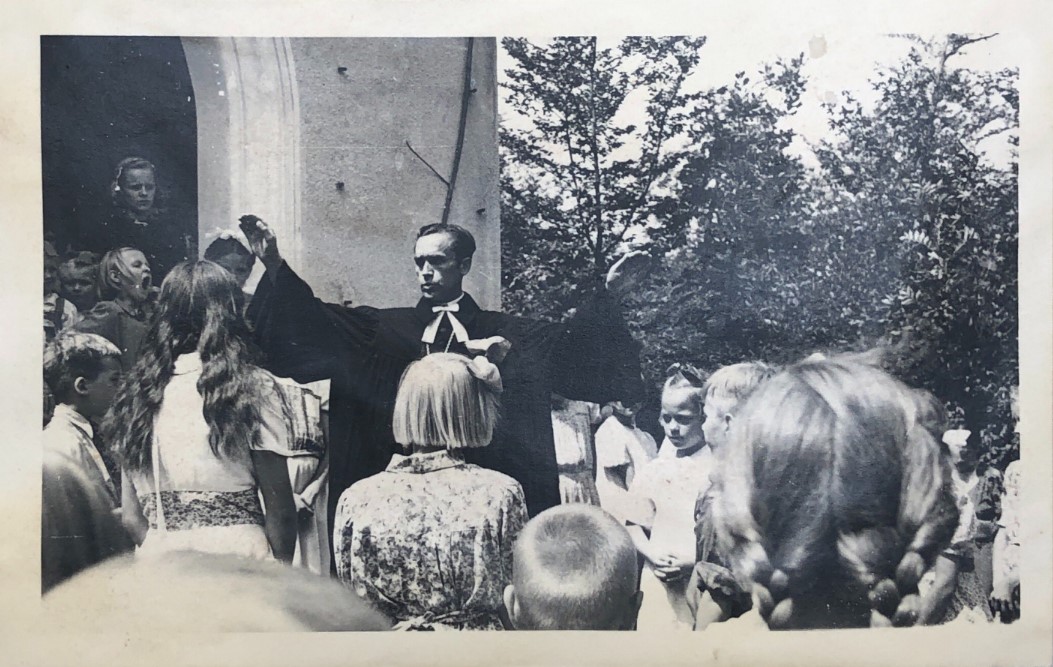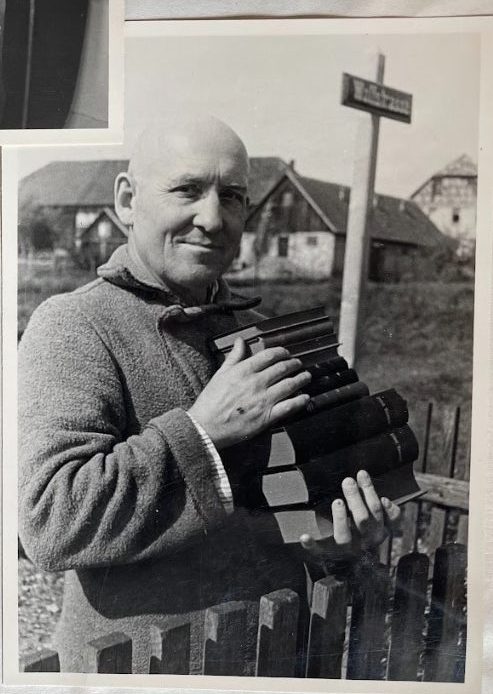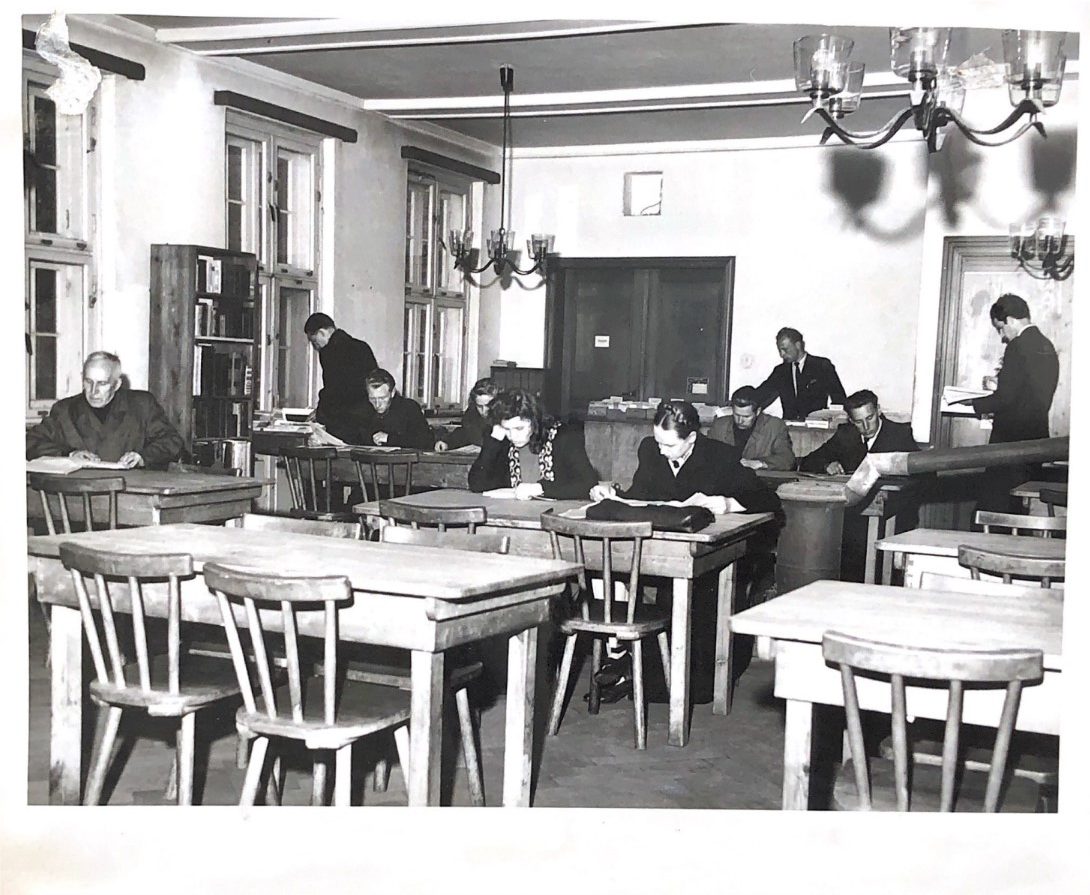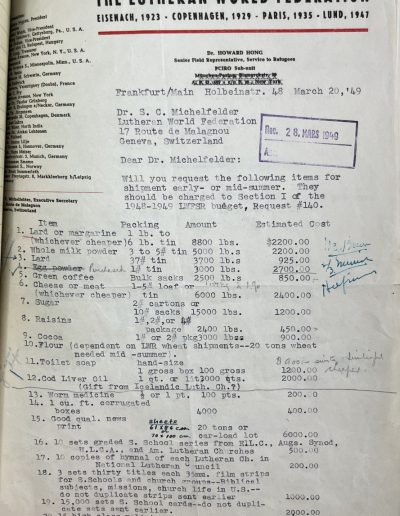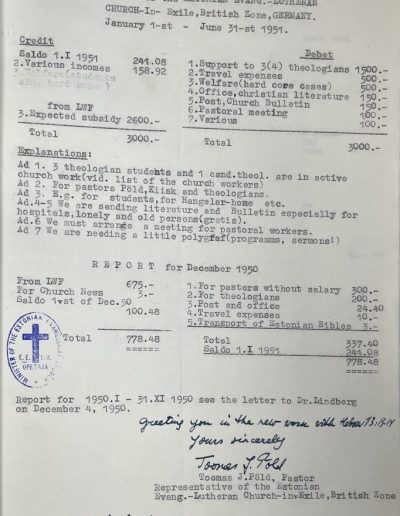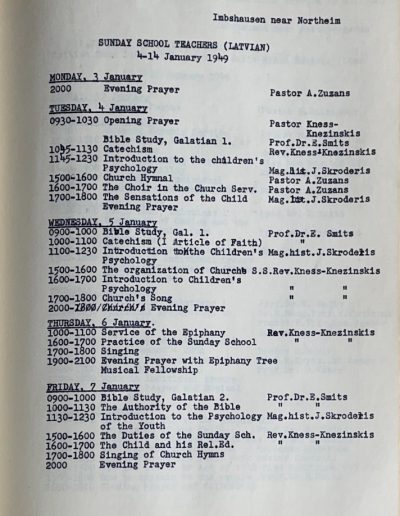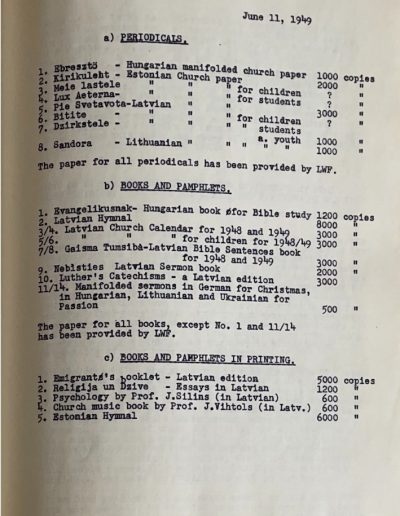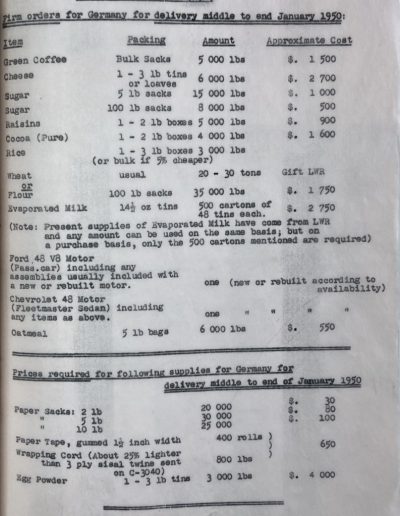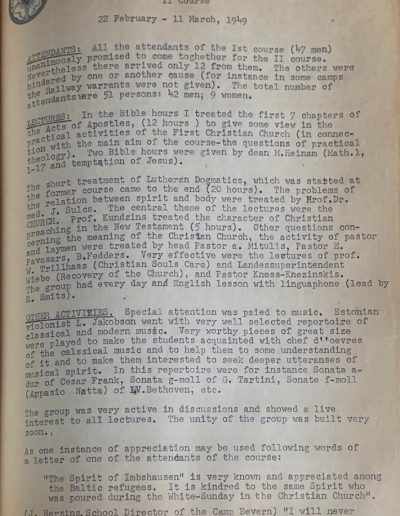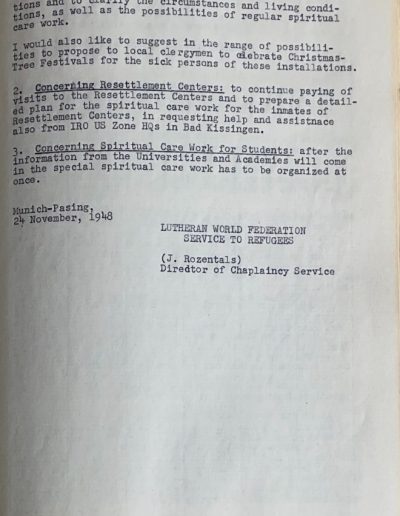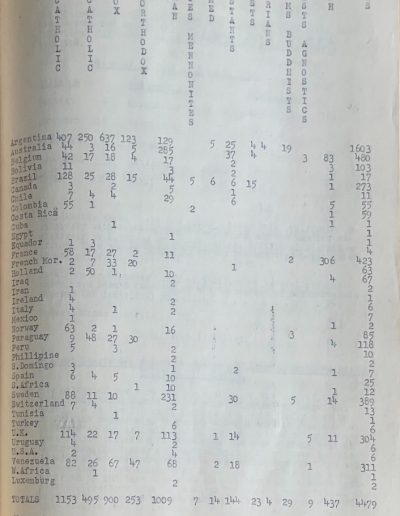LWF-SR Support Programs
To supply the spiritual and material needs of those under their care, LWF-SR set out to create multiple support programs. Under the leadership skills and dedication of the staff, the LWF-SR ended up creating around five main programs (congregational care, chaplaincy service, study centers, religious education, and resettlement) with three smaller companion programs (youth work, publications, and student work). These programs worked together to reach as many persons as possible, whether that be through finding pastors to serve persons in hospitals (chaplaincy service), training up new Sunday School teachers for camp congregations (study centers), or making sure congregations have the necessary materials to print their stories (publications).
Congregational Care
LWF-SR quickly realized that to truly minister to Lutherans in need they must ensure their physical health is cared for first, hence the creation of the congregational care program. Through the aid of Lutheran World Relief, its own resources, and Lutheran churches globally, the congregational care program collected food, sanitary supplies, clothing, and additional items for those in need. For example, alongside food, one LWF-SR officer in the British Zone distributed “soap, Klex, Kiddie Kits, candles, matches, fruit drops, combs, razor blades, safety pins, Vaseline, hair oil, [and] shaving cream.”1 From here, LWF-SR workers would distribute packages to congregations and those in particular need, whether that be pastors, “special hardship” cases, or families.
Chaplaincy Service
To provide fellowship to all, the chaplaincy service directed itself to those that were on the outskirts of or disconnected from camp congregations–persons in hospitals/sanitariums, orphanages, and college campuses. Extending a heart and hand to them, the chaplaincy service assigned pastors or deaconesses to certain areas to go out and attend to Lutherans there through prayer and religious services. LWF-SR workers would also distribute medicines or additional food to and advocate for those under their care. Ultimately, the value of the chaplaincy service relied on the importance of presence.2
“The shepherd who had sought out the one lost sheep.”
one refugee’s description of the chaplaincy service3
“The centers have given heart and content to the work of the LWFSR.”
James Anderson, director at Imbshausen5
Study Centers
To service the current leadership and help train the new, LWF-SR employed two displaced pastors to organize the study centers at Imbshausen (founded in April 1948) and Berchtesgaden (founded in July 1948). Here courses were provided such as: a course for Latvian Sunday school teachers, theological refresher courses, and “Lutheran Pastors Orientation on Emigration.”4 Outside of courses, Imbshausen and Berchtesgaden existed as meeting places for pastors or LWF-SR staff and even storage. Overall, people that entered were able to rest from the toils of camp life, even if for a moment, and then prepare to serve their congregations when they return.
Religious Education
Religious education embodied the “spiritual aid” purpose of LWF-SR, as it ensured that camp congregations had the suitable materials for service (communion sets, hymnals, pastor’s robes, etc.) and general religious life (Bibles, catechisms, children’s educational material, etc.). Also, alongside the youth work program, they provided different Bible picture cards, film strips, and educational programs to Sunday school teachers and children throughout the Allied Zones and sought to help set up new, sustainable children’s programs in camps. On the whole, getting camp congregations to their feet was the true accomplishment of this program.
“Not even song sheets could be obtained.”
a Latvian pastor on needs of his congregation6
Resettlement
In 1948, headed by Stewart Herman, LWF-SR began its resettlement program, working as a volunteer, sponsoring agency. What this means is that LWF-SR worked in organizing assurances, interviewing families, collecting documentation, and being a person to ask questions for those they sponsored. Rarely was the resettlement process smooth or easy to understand. Thus, to educate those desiring to emigrate LWF-SR also distributed “Emigrant booklets” with need-to-know information on emigration and provided classes at the study centers to teach pastors about the process. Another way LWF-SR counseled families or persons emigrating was by setting up a representative at Camp Grohn (a camp where refugees about to emigrate from Bremen stayed) for any questions or concerns they had. Through the messy process of resettlement, LWF-SR attempted to provide at least information and support to those they sponsored.
Smaller Divisions
Youth Work
Many children were left unaccompanied or orphaned after World War II and many pastors and families held concern over what children learned from camp life. Strongly connected to the religious education program, the youth work program aimed to organize Sunday schools and youth programs and to find/create resources (Sunday school teachers, children’s Bibles, religious educational material, etc.) for such programs.
Publications
In March 1949, Howard Hong, head of the LWF-SR spiritual ministry and welfare staff at the time, requested for an order including 20 tons of good quality newsprint estimated to cost $6,000.7 This order demonstrates how much aid LWF-SR had in the publication and printing of newspapers for camp congregations. But they did not stop at newspapers. Bibles, pamphlets, hymnals, educational books, and so much more were produced in refugees’ native languages with the aid of LWF-SR. There even was a multigraph machine set up in Munich for printing purposes.
Student Work
After the 1948 Currency and Economic Reform, many displaced person college students began to struggle with paying for their education and were already disconnected from congregations to seek spiritual or emotional support. With LWF scholarship program and regular visits to universities (whether by LWF-SR workers or pastors with the chaplaincy service), LWF was able to service struggling students.
Below are a variety of primary documents found during the research process that were deemed valuable for exhibition. Dig through the different order requests, expense reports, or schedules to begin to understand the every-day of LWF-SR work.
Michelfelder-Hong Order Request 1949 (LWF-A)
LWF-SR required a lot of different types of material to suit many different types of needs. In this order request from Howard Hong to Sylvester Michelfelder, one can see the variety of needs fulfilled: whole milk powder (additional nutrition), cod liver oil (a supplement thought to have many health benefits), good quality news print (for church newspapers and periodicals), and film strips for Sunday Schools (for general religious education and youth work).
Estonian Ev. Church in Exile Expense Report 1950 (LWF-A)
With subsidies from LWF and their own incomes, Churches like the Estonian Evangelical Church in Exile were able to sustain their religious needs/work. One can see their various needs in the “debet” section.
Sunday School Teacher Schedule Imbshausen 1949
Imbhausen served as a great training center for rising Sunday School teachers. Here is a typical schedule to their day at the Imbshausen Study Center.
Publications with Support from LWF-SR 1949
The Lutheran World Federation Service to Refugees provided a lot of aid in the publication and print of various periodicals, books, and pamphlets for the Churches in Exile. Here is a slice of what they helped produce.
Materials from U.S. and Germany 1950
The LWF-SR procured materials for their service, whether that be congregational care or additional staff needs, from multiple countries. Depending on the prices of items and shipping, they would ship items to their main warehouses and headquarters to ship from there. Here are orders from the United States and Germany around 1950.
“Spiritual Leadership in the Congregation” Course at Imbshausen 1949
“Spiritual Leadership in the Congregation” is one example of the many courses provided by Imbshausen Study Center. Take note of the complications of attending the course, the lectures provided, and the additional activities attendants got to do here.
Future Projects in the Chaplaincy Service
Looking to the future of the chaplaincy service, director in the U.S. Zone Janis Rozentals also demonstrates the priorities and services of the chaplaincy service.
Individual Migration Departures 1947-1949 based on Religious Affiliation
Multiple different religious groups and organizations were at work in Post World War II Germany. This means that not only Lutheran displaced persons were in need and desired to resettle. But looking at the figures alone, in comparison to other groups, they were a group that held relative success in the resettlement process.
Endnotes
- Reuben C. Baetz, Service to Refugees, 1947-1952, (Geneva: Lutheran World Federation, 1952), 14.
- Kenneth C. Senft, “The Lutheran World Federation and the Displaced Person” (PhD diss., Lutheran Theological Seminary, 1952), found in Kierkegaard Library Rare Books Room, 58.
- Baetz, Service to Refugees, 19.
- James Anderson, quoted in “Lutheran Study Centers,” in Lutheran World Federation Service to Refugees in Germany 1947-1949. Materials for Report, vol. 1, ed. Howard Hong (1949), 275.
- “Sunday School Teachers (Latvian) 4-14 January 1949,” in Lutheran World Federation, 295.
- Unnamed Latvian pastor, quoted in Service to Refugees, 13.
- Howard Hong, Howard Hong to Sylvester Michelfelder, March 20th, 1949, Box 9, Folder 1, Lutheran World Federation Archive, Geneva, Switzerland.
References
Baetz, Reuben C. Service to Refugees, 1947-1952 . Geneva: Lutheran World Federation, 1952.
“Geschenk von James V. Anderson des 1948-1950 Das ‘Lutheran Study Center Imbshausen’ für Displaced Persons,” 2007. S 09 rep Nr. 394. Landeskirchliches Archiv, Hannover.
Lutheran World Federation. Lutheran World Federation Service to Refugees in Germany 1947-1949. Materials for Report . Edited by Howard V. Hong. Vol. 1, 1949.
Lutheran World Federation. Lutheran World Federation Service to Refugees 1947-1949 Photographic Section . Edited by Howard V Hong, 1949.
Material Relief Germany Supplies, 1951 1949. Box 9, Folder 1. Lutheran World Federation Archive, Geneva.
Representatives and Field Office Germany Frankfurt/M Aid to DP Churches (Financial), Leaders of Churches in Exile, NWC. Correspondence, NLC-LRS (C. Cox), YM/YMCA (YWCA), 1949- 1951. Box 7, Folder 3. Lutheran World Federation Archive, Geneva.
Senft, Kenneth C. “The Lutheran World Federation and the Displaced Person.” Lutheran Theological Seminary, 1952. Kierkegaard Library Rare Books Room.
“Spiritual Ministry to Displaced Persons,” n.d. Box 3, Folder 4, National Lutheran Council Division of Public Relations Correspondence Files Correspondence Files, 1947-1949. Archives of the Evangelical Lutheran Church in America.
Click the button below to view the complete bibliography for this digital exhibition.
Photo Credits (from top to bottom, left to right)*
- Man (Kenneth Senft) standing next to a car and pointing to the distance (left) and a young family with a father, daughter, and baby (right), Lutheran World Federation Service to Refugees 1947-1949 Photographic Section, used with permission of the Lutheran World Federation and Evangelical Lutheran Church in America.
- Group of men unloading truck, Lutheran World Federation Photographic Section, used with permission of the Lutheran World Federation and Evangelical Lutheran Church in America.
- Man with LWF badge on shoulder speaking with three men in beds, Lutheran World Federation Photographic Section, used with permission of the Lutheran World Federation and Evangelical Lutheran Church in America.
- People sitting in chairs watching on man in front in a room with a chandelier, Lutheran World Federation Photographic Section, used with permission of the Lutheran World Federation and Evangelical Lutheran Church in America.
- Group of people sitting/standing in four rows, Lutheran World Federation Photographic Section, used with permission of the Lutheran World Federation and Evangelical Lutheran Church in America.
- Woman giving lecture from podium to a group of people, Harry Nurmet, “French Zone Report May 1949,” in Lutheran World Federation Service to Refugees in Germany 1947-1949. Materials for Report, vol. 1, ed. Howard Hong (1949), used with permission of the Lutheran World Federation and Evangelical Lutheran Church in America
- Four children and likely parent behind waving from a train, Lutheran World Federation Photographic Section, used with permission of the Lutheran World Federation and Evangelical Lutheran Church in America.
- Howard Hong writing with two older women watching, Lutheran World Federation Photographic Section, used with permission of the Lutheran World Federation and Evangelical Lutheran Church in America.
- Pastor with his hands raised surrounded by children, Lutheran World Federation Photographic Section, used with permission of the Lutheran World Federation and Evangelical Lutheran Church in America.
- Man holding a stack of books, Nurmet, “French Zone Report May 1949,” in Lutheran World Federation Service, used with permission of the Lutheran World Federation and Evangelical Lutheran Church in America.
- People sitting and reading at desks, Lutheran World Federation Photographic Section, used with permission of the Lutheran World Federation and Evangelical Lutheran Church in America.
Within Document Gallery
- Michelfelder-Hong Order Request 1949, found in and used with permission of the Lutheran World Federation Archive.
- Estonian Ev. Church in Exile Expense Report 1950, found in and used with permission of the Lutheran World Federation Archive.
- Sunday School Teacher Schedule Imbshausen 1949, in Lutheran World Federation Service to Refugees in Germany 1947-1949. Materials for Report, vol. 1, ed. Howard Hong (1949), 295, used with permission of the Lutheran World Federation and Evangelical Lutheran Church in America.
- Publications with Support from LWF-SR 1949, Lutheran World Federation Service, 202, used with permission of the Lutheran World Federation and Evangelical Lutheran Church in America.
- Order-Materials from U.S. and Germany 1950, used with permission of the Lutheran World Federation Archive.
- “Spiritual Leadership in the Congregation” Course at Imbshausen 1949, Lutheran World Federation Service, 281, used with permission of the Lutheran World Federation and Evangelical Lutheran Church in America.
- Future Projects in the Chaplaincy Service, Lutheran World Federation Service, 231, used with permission of the Lutheran World Federation and Evangelical Lutheran Church in America.
- Individual Migration Departures based on Religious Affiliation 1947-1949, Lutheran World Federation Service, 363, used with permission of the Lutheran World Federation and Evangelical Lutheran Church in America.
*Description ordering is based on computer view. If viewing this page on a smartphone or tablet, please check the descriptions provided as the ordering may be distorted.
